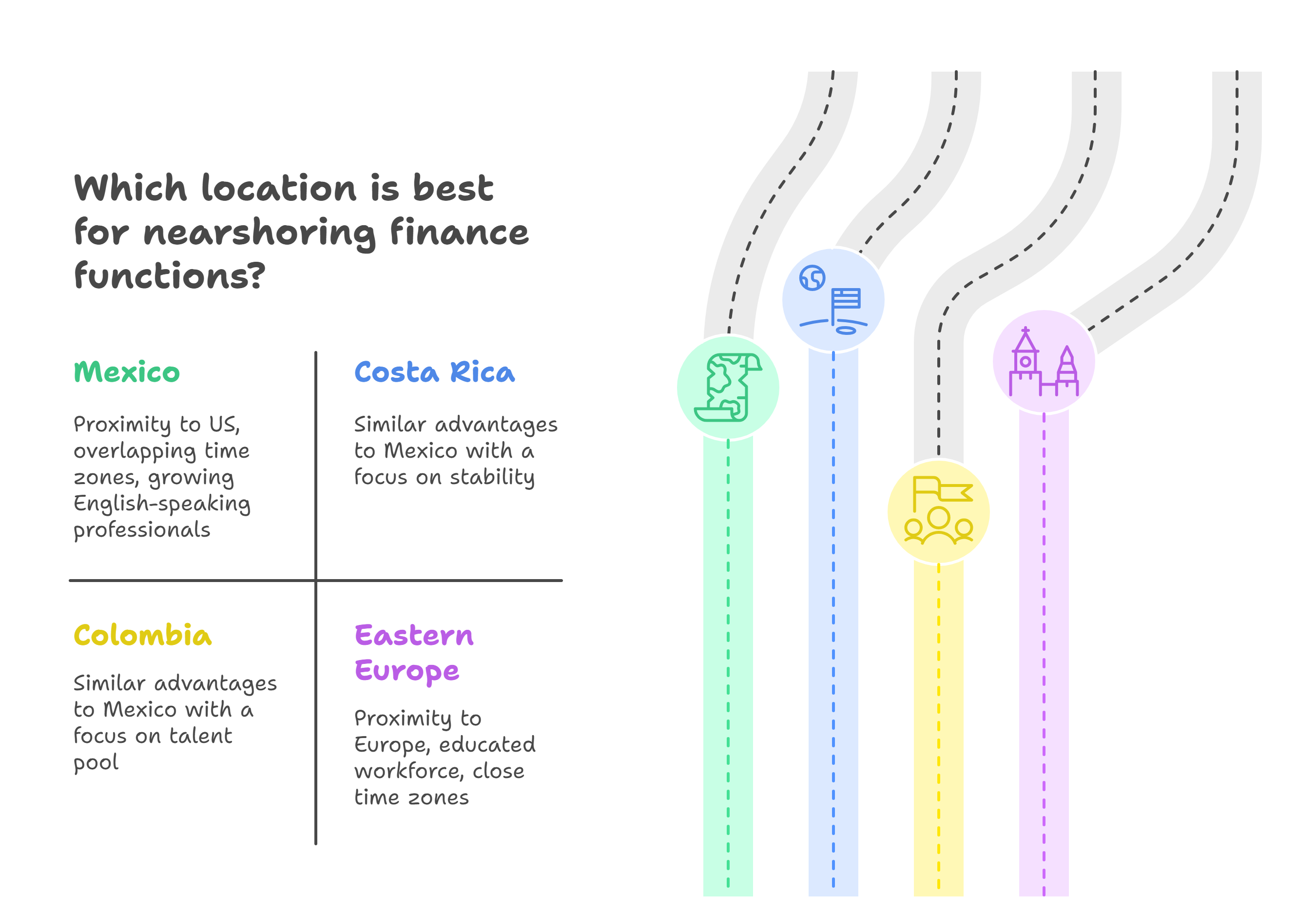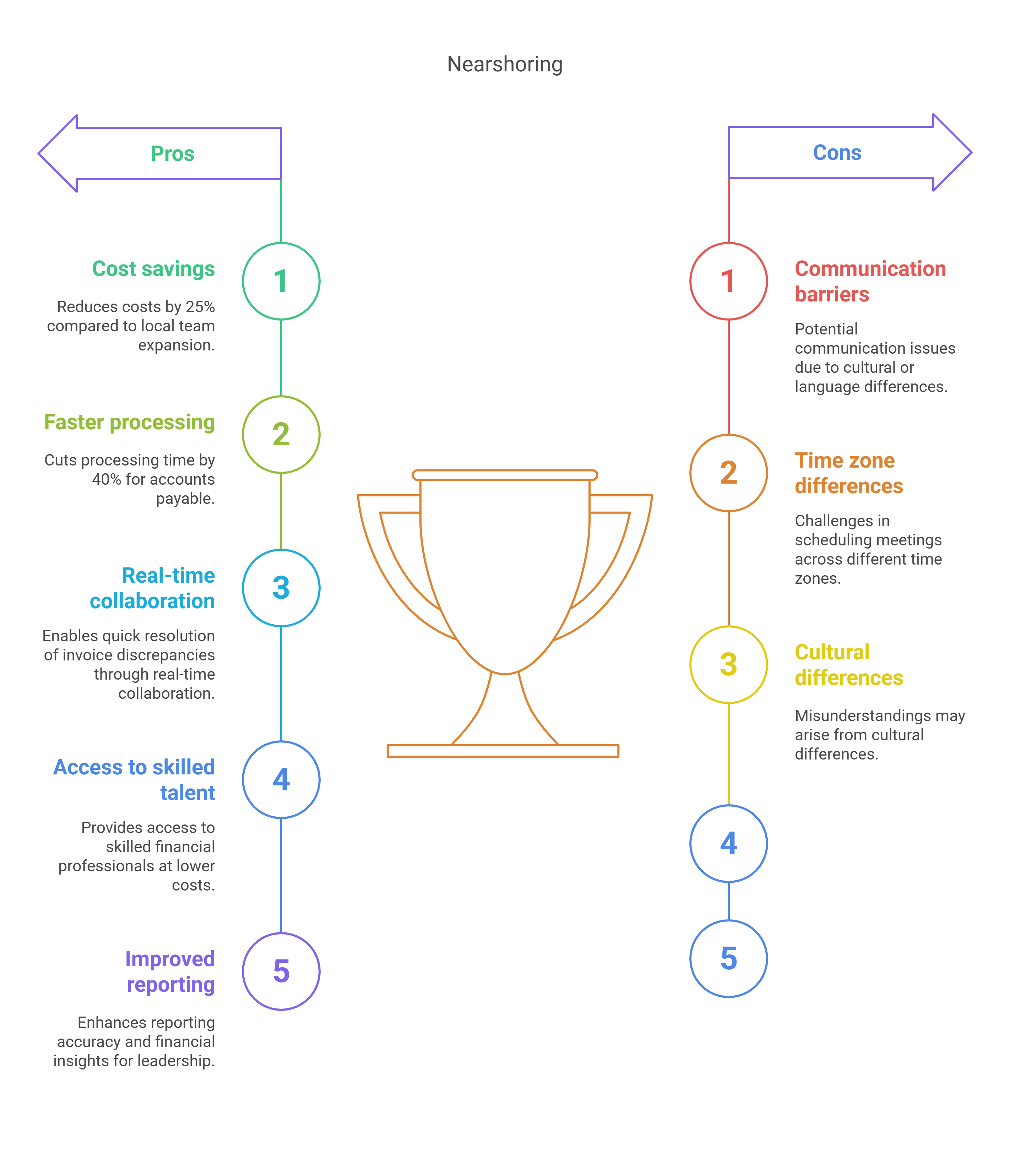Financial leaders tired of budget overruns and slow reporting cycles are rethinking old-school outsourcing. When every lost hour and misstep means wasted revenue, traditional models fall short. What if you could cut costs, collaborate in real-time, and tap top-tier talent—without the headaches of distance or cultural misalignment? Finance and accounting nearshoring solutions promise just that. ✨
Here’s the core truth: Nearshoring isn’t just about savings—it’s about gaining operational agility, rapid communication, and frictionless integration with your existing team. You’ll walk away knowing: why nearshoring outpaces offshoring for finance functions, which benefits matter most for CFOs, and how Nearshorely delivers scalable, compliant services to power your growth. ✅
Nearshoring in finance and accounting means entrusting specific financial processes to skilled professionals located in nearby countries. Think bookkeeping, accounts payable/receivable, payroll, financial reporting, and even fractional CFO duties. It’s like extending your team geographically, but to a place close enough that time zones align comfortably and travel isn’t a major ordeal. The idea is to gain efficiency and cost advantages without the significant cultural or logistical hurdles often found with more distant arrangements.
The mechanics are focused on integration. Instead of simply handing off a task into a black box, nearshoring aims for your remote team members to feel like part of your internal department. This involves shared workflows, common communication platforms, and processes designed for smooth handoffs and real-time interaction. Financial tasks commonly nearshored include everything from routine data entry and bank reconciliations to complex financial modeling and compliance reporting. The goal is to improve throughput and accuracy while managing costs effectively. 💰
“Nearshoring is a form of offshoring in which an organization recruits employees from a neighboring country to complete services.” -TTEC
Okay, let’s talk perks! The most obvious advantage is often significant cost reduction compared to hiring locally. Labor costs in nearshore locations are typically lower, leading to substantial savings on salaries, benefits, and overheads. But it’s way more than just saving a buck. You also gain access to a wider pool of skilled finance and accounting professionals than might be available or affordable in your immediate area. This means finding the right expertise for specialized tasks becomes much easier.
Improved efficiency is another huge win. With teams working in similar time zones, real-time collaboration becomes the norm. This accelerates daily tasks, speeds up month-end closes, and makes urgent problem-solving much faster. Imagine asking a quick question and getting an answer within minutes, not hours or days! This rapid feedback loop minimizes delays and keeps your financial processes flowing smoothly. Plus, dedicated nearshore teams can focus purely on their assigned tasks, freeing up your internal staff for higher-level strategic work. 🚀
.png)
For finance leaders, these benefits translate directly to better performance. Faster closing cycles provide more timely insights for decision-making. Enhanced data protection practices and regulatory understanding in nearshore locations improve compliance posture. And the increased control over workflows and direct communication channels mean fewer surprises and greater confidence in the accuracy of your financial reporting. It’s about getting your numbers right, faster, and feeling good about the process.
“Nearshore accounting outsourcing helps teams complete tasks more quickly by enabling real-time collaboration and providing dedicated resources.” -SkaleHive
When businesses first started looking outside their borders for finance work, traditional offshoring (think India, the Philippines) was the main game. It offered substantial cost savings, but often came with challenges: significant time differences making real-time calls tough, potential language barriers, and cultural nuances that could complicate communication and process understanding. Picture trying to explain a complex tax rule to someone on the other side of the globe with an 18-hour time lag! 😩
Nearshoring takes a different approach. By choosing countries geographically closer (like Mexico or Costa Rica for the US, or Eastern Europe for Western Europe), you dramatically reduce time zone overlap issues. This enables synchronous work, making daily stand-ups, impromptu questions, and collaborative problem-solving totally possible. Cultural similarities often mean smoother communication and fewer misunderstandings regarding business etiquette or regulatory expectations. Quality control is often easier to maintain with closer proximity, making oversight less stressful. It’s about getting the cost benefits of working internationally, but with much less operational friction. ✨
“Nearshore outsourcing stands out with benefits like real-time collaboration, closer cultural alignment, and cost reductions of 25-40%.” -SkaleHive
Let’s break down where the savings come from. The primary source is lower labor costs. The cost of living and average salaries for skilled finance and accounting professionals in nearshore countries are typically lower than in major economic hubs like the US or Western Europe. This means you can access equally qualified talent for significantly less, often achieving savings of 25-40% on personnel expenses. Beyond salaries, you save on local hiring costs, benefits packages, office space overheads, and IT infrastructure associated with growing an internal team.
Nearshoring also helps you manage variable workloads cost-effectively. Need extra hands during tax season or year-end close? A nearshore partner can quickly ramp up resources without the commitment of permanent hires. Business slowing down? You can scale back more easily than with a traditional employee model. This flexibility makes your finance department more agile and ensures you’re only paying for the resources you truly need, when you need them. It’s a smart way to keep your financial operations lean and efficient. 💸
“Cost Reduction – One of the biggest reasons businesses engage in nearshoring is cost reduction.” -Valenta.io
Imagine trying to coordinate a complex financial report across a vast cultural and linguistic divide. Even small misunderstandings can lead to errors or delays. Nearshoring often means working with teams who share closer linguistic ties and cultural norms. This makes day-to-day communication much smoother and more intuitive, reducing the potential for costly errors and accelerating the integration of the nearshore team into your existing workflows. It helps build a stronger sense of cohesion, making everyone feel more like one team.
Time zone alignment is perhaps the most practical benefit for daily operations. When your teams can work together for a significant portion of the day, real-time questions get answered instantly, urgent tasks are addressed promptly, and collaborative projects move forward without frustrating delays. This isn’t just convenient; it’s essential for critical finance functions where timely processing and quick problem-solving are paramount. Think about closing the books, processing payroll, or managing cash flow – tasks that benefit immensely from synchronous collaboration. ⏰
“Its proximity and cultural match facilitate teamwork and communication that are in sync with your business.” -Strategic CFO®
Handing over sensitive financial data requires absolute trust and robust security measures. Reputable nearshore providers understand this deeply. They prioritize data protection, often holding certifications like ISO 27001, which demonstrates a commitment to world-class information security management systems. They establish secure communication channels, implement strict access controls, and follow rigorous audit trails to safeguard your information against breaches or unauthorized access.
Regulatory compliance can be complex, especially across borders. Nearshore locations often have legal frameworks and data privacy laws that are more aligned with Western standards than more distant regions. This can make navigating compliance requirements less complicated. A good nearshore partner stays current on relevant regulations (like GDPR, if applicable) and builds compliance into their processes, offering you peace of mind that your financial operations meet necessary standards. They act as a safeguard for your sensitive financial activities. 🔒
“ISO 27001 compliance ensures security.” -SkaleHive
Picking the perfect spot for your nearshore finance team involves looking at a few key things. First, consider the available talent pool: Is there a strong supply of skilled finance and accounting professionals with relevant experience and language proficiency (especially English)? Next, think about political and economic stability – you want a reliable environment for long-term partnership. Look into the country’s established business infrastructure, including reliable internet and power, and its legal system regarding business operations and data protection.
For US companies, countries like Mexico, Costa Rica, and Colombia are popular choices due to their geographical proximity, overlapping time zones, and growing pools of English-speaking finance professionals. For European businesses, Eastern European countries often offer similar advantages with highly educated workforces and relatively close time zones. The key is finding a location that balances cost advantages with talent availability, stability, and cultural/time zone alignment to ensure a smooth working relationship.

So, how does this all come together with Nearshorely? It starts with understanding your specific finance and accounting needs. Nearshorely works with you to define which processes make the most sense to nearshore, whether it’s routine bookkeeping, complex financial analysis, or managing entire functions like accounts payable. They then help you build a dedicated team extension tailored to those requirements, bringing on professionals who fit your specific criteria and company culture. Think of them as your expert matchmakers and operational partners.
Onboarding is designed to be efficient. Nearshorely helps integrate your new team members into your existing technology stack and workflows, ensuring everyone is on the same page from day one. They provide ongoing support, dedicated account management, and flexible contract terms that grow with your business. Communication is secure and transparent, and they focus on building a strong, collaborative relationship so your nearshore team feels like a seamless part of your internal finance department. Curious? Visit Nearshorely.com to see how they can help you. 👍
Okay, let’s be real – no business shift is without its potential bumps. Integrating a remote team, even a nearshore one, requires thoughtful planning. You might face initial challenges with communication styles, workflow adjustments, or simply getting used to managing a team that isn’t down the hall. Change management is key here; ensuring your internal team understands the benefits and process of working with the nearshore team is crucial for a successful partnership.
Mitigation involves clear communication channels, regular video calls, defined performance metrics, and a phased approach to transitioning tasks. Think about starting with simpler processes and gradually moving to more complex ones as confidence and familiarity grow. Nearshorely helps navigate these potential obstacles by providing support in workflow design, communication best practices, and performance tracking, helping you build a strong, effective working relationship right from the start. They’ve done this before! 😉
Consider a mid-sized e-commerce company struggling with slow and error-prone accounts payable processes, causing delays in vendor payments and straining relationships. By nearshoring their AP function, they reduced processing time by 40%, achieving a 25% cost saving compared to expanding their local team. The nearshore team, working in a closely aligned time zone, could resolve invoice discrepancies much faster through real-time collaboration, leading to happier vendors and a more efficient cash flow.
Or picture a fast-growing tech startup needing to scale its financial reporting and analysis capabilities rapidly but lacking the budget for multiple senior hires in their expensive home city. By partnering with a nearshore provider, they gained access to skilled financial controllers and analysts at a fraction of the cost. This allowed them to improve reporting accuracy, add valuable financial modeling, and provide better insights to their leadership team, all while maintaining healthy margins and supporting their growth trajectory. It works! 🎉

Outsourcing finance and accounting operations to distant offshore teams often introduces new headaches—miscommunication, time delays, and compliance risks. Nearshoring flips the script. With closer cultural alignment, same-time-zone collaboration, and tangible cost savings, companies achieve faster closes, better accuracy, and real control over their numbers. It’s a smarter way to leverage global talent.
Nearshorely delivers tailored finance and accounting nearshoring offerings designed for ambitious businesses that demand results. Ready to experience rapid onboarding, a dedicated team extension, and seamless operations? Visit Nearshorely.com to schedule your consultation and transform the way your finance department operates. Let’s get your numbers working for you! 💪📈